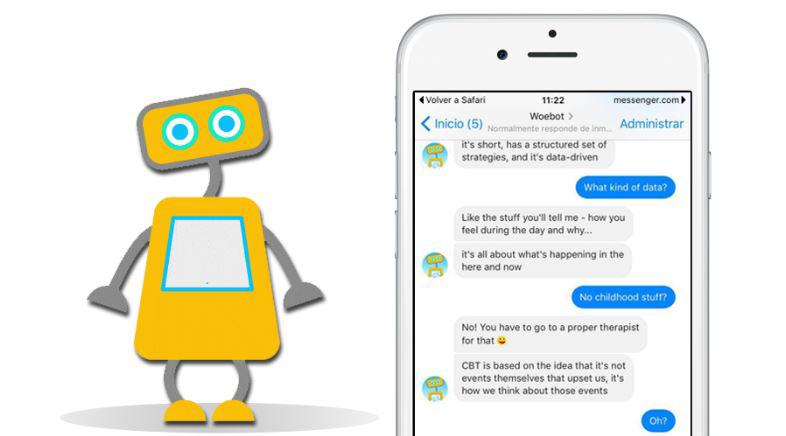All About Woebot
-By Sania Patel

Mental health is commonly described as the emotional, psychological, and social well-being of a person. These factors play a key role in how a person thinks, feels, and acts. Mental health also determines how people handle certain situations, relate to others, and make choices. A person’s state of mind can also affect their physical wellbeing; poor mental health can lead to conditions such as diabetes, heart disease, and stroke. The Centers for Disease Control and Prevention (CDC) have recognized mental illnesses to be the most common health condition in the United States. The CDC reports,
“more than 50 percent will be diagnosed with a mental illness or disorder at some point in their lifetime.”
Mental health care is often hard to access due to outside commitments, lack of access, and overall diminishing faith in the ability of the service to treat mental illnesses. People often find issues with confiding in therapists and other medical professionals. They also find it hard to make time in their schedule and commit to the changes made in their lives.
The potential of artificial intelligence to enter mental health care services is becoming more apparent. One example of AI in mental health care is an app called Woebot. Woebot acts as a personal mental health ally that helps participants organize and understand their emotions, inner thoughts, and personal feelings, thus limiting the development of mental illnesses. Woebot is a particularly revolutionary AI mental health care service, as it completely replaces the profession of therapists.
As an app, Woebot is accessible whenever, wherever. It doesn’t matter if a patient is in Europe, Hawaii, or Australia, nor does the time matter. All areas and all times are covered, undermining the position of waiting rooms and appointments. The increased accessibility allows all people of all different backgrounds to participate. To start, not only is Woebot applicable on both desktop and mobile phones, but it also is free. This helps ethnic minorities and impoverished people, the most at risk to develop a mental illness, to finally seek care. Since Woebot is an AI technology, it holds no bias, further allowing minorities - in particular - to seek care without fear of being misdiagnosed or criticized for their behaviors.
In short, Woebot is a therapy chatbot. Woebot was developed through the analysis of Cognitive Behavioral Therapy (CBT), Interpersonal Psychotherapy (IPT), and Dialectical Behavioral Therapy (DBT), all of which are potential treatments for certain mental illnesses. Through the use of AI and NLP, Woebot uses a series of questions and offers guidance to provide overall therapeutic support. Woebot acts as a real person; the application listens, learns, and delivers care that specifically addresses the issues of the user. Many clients raise the idea that Woebot not only acts as a therapist, but also a friend. Woebot develops quick conversations and check-ins to curate sets of clinically-tested tools and tactics specifically suited towards the patient.
Woebot offers four different types of conversations - immediate, personal, accepting, and actionable. These specific settings are used to help Woebot understand the headspace of the patient, and it develops a particular set of responses, words, and overall language to imitate the actions of a real therapist. Woebot also uses every interaction to re-teach its AI to develop further, allowing the platform to become smarter and more accurate.
Overall, Woebot is a free application that works on both desktop and mobile phones. It is accessible from anywhere at any time. Powered by constantly developing AI, Woebot curates specific sets of treatment to help manage and eliminate common mental illnesses such as stress, anxiety, and depression. Unlike other AI mental health care services, Woebot works with its patients, acting as a therapist. The system nurtures trust and respect, immediately searching for diagnosis and cures for a user. There have been many studies that have proved Woebot to be even more effective than traditional therapy. Unlike current therapists, Woebot offers information to people of all income and ethnic backgrounds. There are no appointments, lines, schedules, or other commitments. There is also less pressure on the patient, as Woebot is an unbiased AI system, thus providing the most accurate diagnosis for patients.
As proven with Woebot, AI has the ability to replace certain services that apply to mental health care. Therapists, medications, and other treatment options have proven to be very flawed. Human therapists can be expensive, hard to access, and biased, while medications can be abused and cause unwanted side effects, besides the high price. AI has the ability to creatively judge and solve the issues of mental illnesses. AI has no bias and is typically cheaper than current treatment options. AI has no prior commitments, appointments, or schedules to be made. With AI, people feel more comfortable confessing their personal information, and they feel more appreciated, as the technology is constantly available to offer support.
As AI arises in mental health care there are many concerns that come to mind. One has to question that potential of AI to completely replace humans in mental health care services. If so, what happens to the medical professionals in that field? To take these issues farther into the future, what are the implications of AI on other medical sectors? Does AI truly have the potential to take over the majority of medical professions? How will this affect humans in this sector? In the end, only time will reveal the answers to these questions.